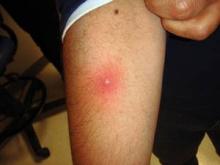BETHESDA, Md. — Draining abscesses and obtaining cultures are now more important to the management of pediatric skin and soft tissue infections in the era of community-acquired methicillin-resistant Staphylococcus aureus infections.
Skin and soft tissue infections remain the most common manifestations of community-acquired MRSA (CA-MRSA) infection, which has increased dramatically in the past decade. Draining abscesses and obtaining cultures from purulent skin infections helps physicians keep tabs on local and regional antibiotic susceptibility patterns, Dr. Sheldon L. Kaplan said at the annual conference on antimicrobial resistance sponsored by the National Foundation for Infectious Diseases."It's important to send cultures, which wasn't the case years ago. It helps to know what we're dealing with on a local level," said Dr. Kaplan, head of the pediatric infectious disease section at Baylor College of Medicine and chief of the infectious disease service at Texas Children's Hospital, both in Houston.
Although invasive CA-MRSA infections are increasingly a concern, skin and soft tissue infections continue to make up the majority of CA-MRSA infections. Among the 12,876 children with community-acquired S. aureus infections who were seen at Texas Children's between Aug. 1, 2001, and June 30, 2009, 73% had a MRSA infection. Of those, 97% were skin and soft tissue infections, compared with 93% of the methicillin-susceptible S. aureus (MSSA) infections.
Image above: Pustule with surrounding cellulitis (Photo courtesy Dr. Sheldon L. Kaplan)


